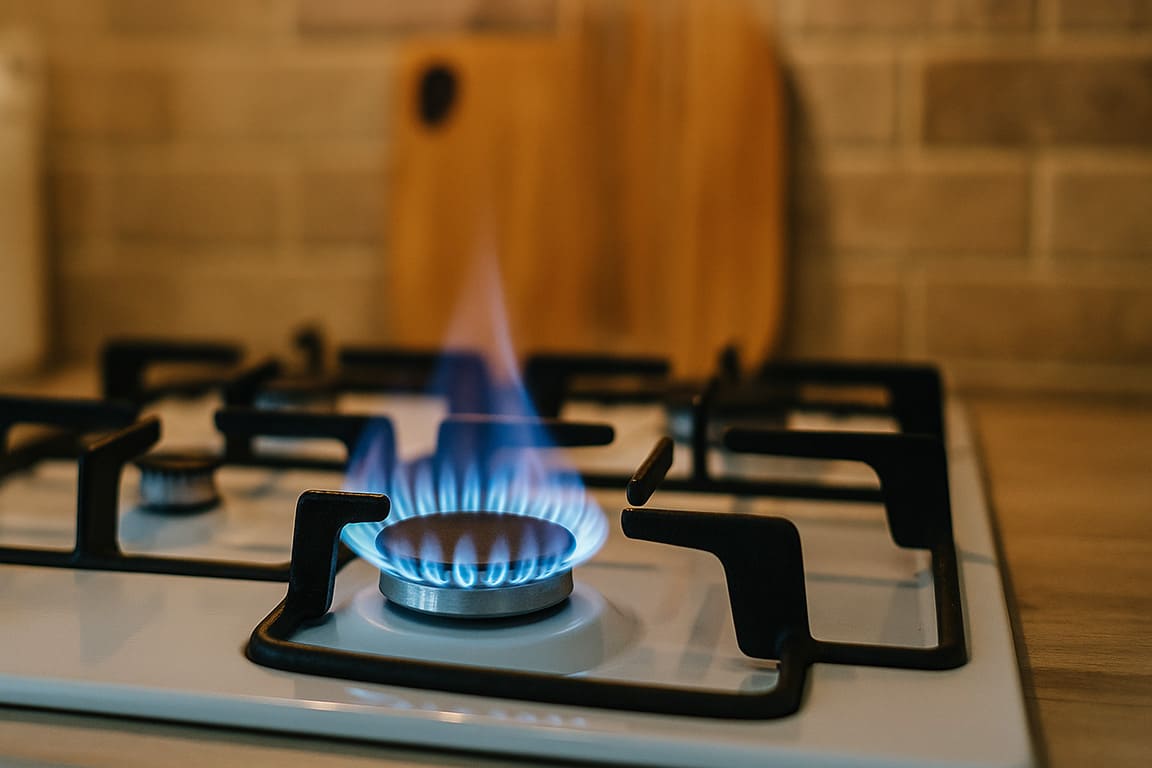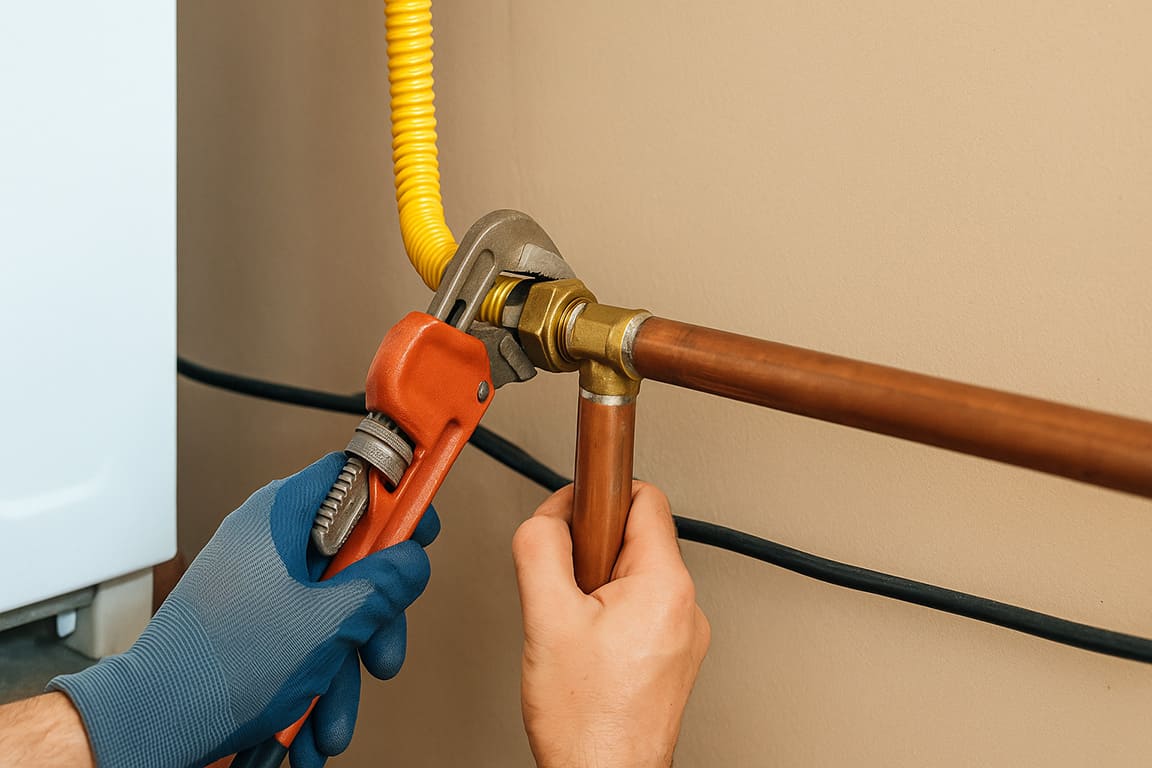Plumbing Service
Gas Line Install Knoxville TN
The first signs you might have a gas line problem
35 years of experience
The smell of rotten eggs wafting through your home signals the need for immediate gas line services. This distinctive odor serves as a safety feature that manufacturers intentionally add to natural gas to warn you about dangerous leaks.
Gas lines are essential components of your home’s infrastructure because they power many household appliances like dryers, stoves, and heating devices such as fireplaces.
Gas line problems can quickly escalate from minor issues to serious safety hazards.
You should never ignore warning signs like hissing sounds near gas lines that often indicate leaks or pressure issues.
Dead vegetation above buried gas lines serves as a visible warning sign. Your gas bills showing unexpected increases without changes in usage patterns might indicate gas escaping somewhere in your system.
Gas lines typically last 50 to 60 years, which many homeowners don’t realize.
Older homes might need professional inspection as their pipes approach the end of their lifespan. Local searches for gas leak repair often lead to companies with decades of experience. Service providers who have helped over 30,000 households maintain safety usually offer the most reliable repair services.
A licensed plumber can complete gas line installations in a few hours to a day, depending on your situation’s complexity.
Note that gas line issues require professional expertise and should never be a DIY project.

Early warning signs of gas line issues could save your home and family. Water leaks show obvious wet spots, but gas line problems are harder to spot at the time. Most homeowners miss these first indicators until the situation becomes dangerous. Here’s what you should watch for to protect yourself.
Noticing strange smells around the house
Natural gas has no natural odor and remains completely odorless in its pure state. Gas companies add chemicals called mercaptans (or methanethiol) that give it the distinctive sulfur or “rotten egg” smell most people know. This added smell serves as a safety feature that helps detect even small gas leaks before they turn dangerous.
A sulfur-like odor around your home, especially near appliances or gas lines, should never be ignored. The smell’s strength often indicates how serious the leak might be. Some people can’t smell well, which makes this warning sign unreliable for them. That’s why gas line services use specialized detection equipment during their inspections.
Hearing odd hissing sounds near appliances
Gas line problems often reveal themselves through hissing or whistling sounds near gas-powered appliances, connections, or pipes. Gas escaping through small cracks, loose connections, or damaged valves under pressure creates these noises. The sound might be faint and you’ll notice it best when your house is quiet.
The hissing might stop when you turn off specific appliances or switch to non-gas settings. To name just one example, a hissing sound near your dryer during operation that stops on the “air fluff” setting points to a gas line problem.
Plants dying for no clear reason
Underground gas line problems often show up as unexplained plant death. Gas leaks into soil and pushes out oxygen that plant roots need to live. Research shows soil near gas leaks can have almost no oxygen compared to healthy soil’s normal 18%. Methane-consuming bacteria multiply in gas-contaminated soil and cause this oxygen depletion.
Watch for unusual patterns of dying vegetation – particularly plants dying in specific areas despite good care. Yellow grass patches, trees with smaller-than-normal leaves, or wilted plants in line or circle patterns might appear. These dying plants often show where underground gas lines are leaking.
These warning signs should prompt you to call a licensed plumber for gas line inspection. Never try to find or fix the problem yourself.

Small Gas Issues Can Turn Into Big Dangers
A subtle gas smell or tiny leak might seem harmless but can quickly become a serious threat. Many homeowners believe they can delay fixing minor gas problems. This belief could put their families at risk.
Gas Leaks and Your Health
Your home’s oxygen levels drop during gas leaks, which creates serious health risks. The first warning signs include headaches, dizziness, nausea, and fatigue. Your eyes and throat might get irritated as exposure continues. Breathing becomes difficult. Direct contact with compressed or liquid gas can cause pale skin or blisters.
The scariest part is how these symptoms endanger everyone under your roof. Your pets aren’t safe either – they might start vomiting, become lethargic, or struggle to breathe. Long-term exposure poses even greater risks. People can develop depression and face declining health. The worst cases lead to unconsciousness or death.
Fire and Explosion Dangers
Gas has extreme volatility. An unfixed leak creates explosion risks that grow worse over time. Safety records show natural gas causes about 4,200 house fires yearly. These fires claim roughly 40 lives each year.
A small leak becomes more dangerous as time passes. Natural gas mixes with the air in your house. The smallest spark could trigger a massive explosion. Something as simple as flipping a light switch or using your phone might set it off.
The Hidden Danger of High Gas Bills
Your gas bill suddenly spikes but you haven’t changed your usage? Gas might be escaping somewhere in your system. You’re not just wasting money – you’re letting a potential hazard build up inside your home.
Gas companies add that distinctive rotten egg smell to help you detect problems. A rising bill combined with occasional gas odors means it’s time to act. Don’t wait and hope things improve. Call a licensed plumber right away to check your gas lines.
How to check if you need gas line repair services
Gas line problems can be scary. You can spot gas leaks early, but safety should be your main concern. I’ve helped many Knoxville homeowners who ignored the warning signs until their situation became dangerous.
Simple checks you can do safely
A soap water test works great on visible gas pipes and connections. Mix some dish soap with water in a spray bottle and apply it where you suspect leaks. Bubbles will show up if gas escapes. This test helps you find small leaks around fittings and connections.
Your senses can tell you a lot. That sulfur smell we talked about earlier is a clear sign. Listen for hissing sounds near your gas appliances – they often mean gas is leaking. You should also look for dirt blowing from ground holes, bubbles in puddles near gas lines, or dead plants around buried pipes.
Your gas meter can tell you even more. Turn off all gas appliances and their pilot lights. The meter shouldn’t move at all. Any movement means gas leaks somewhere in your system.
When to call a licensed plumber for gas line inspection
Strong gas smells, constant hissing noises, or health issues like dizziness and headaches need a licensed plumber right away. The same goes for bubble formations in your soap test or meter movement when appliances are off.
Most experts say you should get professional inspections every 3-5 years. Annual checks give you better peace of mind though. New home purchases or renovations that affect gas systems always need an inspection.
What a professional gas line inspection looks like
Professional inspectors use specialized tools like combustible gas indicators to find even tiny leaks. They check all visible pipes for rust, connection quality, and wear signs.
Inspectors use pipeline pigs or cameras to see inside buried lines. They test pressure levels, shutoff valves, and make sure gas appliances have proper airflow. A complete inspection takes 30-60 minutes based on your home’s size and layout.
You’ll get a detailed report that shows any problems found and what needs fixing or maintenance.
Choosing the right help for home gas line repair
Your family’s safety depends on proper installation and repairs, so finding reliable professionals for gas line issues requires careful attention.
What to look for in a gas line installation service near me
Any company you might hire must have proper insurance and bonding. This protection is crucial – you need coverage if something goes wrong during repairs. A contractor with proper insurance can fix any damage they cause.
You should think over hiring a specialized gas line company versus a general plumbing service. Specialists often charge less since they focus only on gas lines instead of maintaining licenses and equipment for multiple services. You’ll typically pay better prices, and these companies usually get materials cheaper through volume purchasing.
Why experience and licensing matter more than price
The lowest bid might look tempting, but gas line work isn’t the place to save money. Licensed professionals complete specific training and pass exams that verify their knowledge of gas line safety protocols. Master plumbers with gas line certification know proper sizing, material selection, and ventilation requirements.
Experience equals formal credentials in importance. Contractors who’ve worked for decades have seen almost every gas line problem possible. Their practical knowledge helps them solve issues quickly without expensive trial-and-error approaches.
Questions to ask before hiring someone
You should ask potential contractors these questions:
- “Are you licensed and insured specifically for gas line work?” (Request proof and verify the license number)
- “What type of warranty or guarantees do you offer on your workmanship?”
- “What materials do you use for gas lines?” (Quality matters—brands like Gastite and Tracpipe are better protected against lightning strikes and punctures)
- “How do you communicate with clients throughout the project?”
- “Can you provide references from similar gas line installations?”
Note that cutting corners isn’t an option here. A properly installed gas line versus a poor installation could mean the difference between life and death.
How may we help you?
Schedule Service with Us Today
Ready to fix that leak or tackle that to-do list? Give us a ring and let’s get your plumbing back in perfect flow – fast and friendly!
Taking action before it's too late
Gas line problems just need immediate attention. Subtle signs like strange odors, hissing sounds, and dying vegetation can signal life-threatening problems. These warning signals deserve attention, especially given the serious health risks and explosion hazards that gas leaks pose.
Your home’s gas lines serve multiple appliances every day. They’re crucial yet potentially dangerous parts of your household’s setup. Minor gas issues can quickly become major safety concerns, but most homeowners don’t realize this fact. My years in this industry have shown how delayed responses to gas line problems can create devastating situations.
Licensed professionals have the training, equipment, and expertise to handle gas line inspections and repairs safely. DIY fixes might work for other home repairs, but gas line work belongs in expert hands. Safety must come before cost when natural gas is involved.
Those subtle warning signs exist to give you time before disaster strikes. A full-blown emergency isn’t the right time to act. Qualified Knoxville professionals who know gas line systems inside and out are ready to help – call (865) 204-0502 today.
The peace of mind that comes from gas lines that are working safely and managed to keep functioning properly makes any service cost worthwhile. Your family deserves this security. You should sleep soundly without worrying about what might lurk behind your walls or beneath your floors.
Frequently Asked Gas Line Questions
How much does a professional gas line inspection typically cost?
A professional gas line inspection usually costs between $75 to $150 for a basic pressure test, which takes about 30 minutes. More comprehensive tests may cost up to $500 and take over 24 hours, depending on your location and the complexity of your gas system.
What should I do if I accidentally damage a gas line?
If you accidentally hit a gas line, immediately evacuate the area and call 911. Do not attempt to fix it yourself. If anyone is injured, seek medical attention right away. Wait for professionals to shut off the gas and repair the line.
How can I tell if there's a gas line near my property?
The presence of a natural gas meter on your property is a clear indicator that there’s a gas line nearby. This usually means you’re responsible for maintaining the gas line on your property.
What's a simple way to check for gas leaks at home?
A simple method to check for gas leaks is the soapy water test. Mix water with dish soap in a spray bottle, then apply the solution to visible gas pipes and connections. If you see bubbles forming, it indicates a gas leak.
How often should I have my gas lines professionally inspected?
Experts recommend having your gas lines professionally inspected every 3-5 years. However, for better peace of mind, annual inspections are advisable. Always schedule an inspection before purchasing a home or after any renovations that affect gas systems.
Why Choose Sanders Plumbing
Exceeding your expectations, consistently
100% Satisfaction
We’re not happy until you’re thrilled – your satisfaction is always our top priority.
Upfront Pricing
No surprises here – just honest, transparent pricing before the work begins.
Dedication
Our team stays sharp and certified, so you always get expert service you can trust.
24 / 7 Emergency
Day or night, rain or shine, we’re here for you when plumbing problems just can’t wait.


